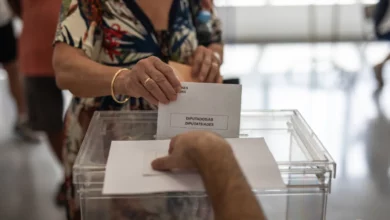The fate of Hussein Salem continues to dominate the headlines of Sunday’s newspapers.
The front page of state-owned paper Al-Ahram reports that Magdy al-Shafie, head of Egypt's Interpol, said that the file sent by Egypt's general attorney to Spanish authorities contains evidence of Salem’s violation of Spanish laws. It proves that the fugitive businessman and associate of ousted president Hosni Mubarak holds both Egyptian and Spanish nationalities, which Spainish law prohibits.
Shafie, however, emphasized that even if Salem gave up his Egyptian nationality, he would not escape the allegations and must face trial in Spain, says Al-Ahram.
Salem fled Egypt a week before Mubarak stepped down on 11 February and was arrested on 15 June in Spain on charges of money laundering. Last month, he was charged with fraud, squandering state funds and corruption regarding natural gas exports to Israel at low prices. The trial is set for 3 August.
The liberal Al-Wafd paper reports that Egypt's Illicit Gain Authority has formed a committee composed of experts from the Justice Ministry and Public Funds Investigation. The committee is to discover the sources of Salem’s enormous wealth and determine which officials were involved in profiteering.
“The bail of Hussein Salem is unprecedented,” reads a headline of another piece about Salem’s case in Al-Wafd. The judge set bails of 12 million euros, 6 million euros and 18 million euros for the release of Salem, his son and his Turkish partner Ali Evsen respectively. The paper covers a BBC article which reports that constitutes a record bail from Spain’s National Court. It adds that Spanish authorities have frozen more than 32.5 million euros in cash, along with properties worth 10 million euros.
Al-Shorouk's main headline has the exclusive news that “Hussein Salem renounces his Egyptian nationality”. The independent daily reports that Salem alleged during questioning in Spain that Egyptian authorities cannot arrest him because he now only holds Spanish citizenship.
The 77-year-old is in a poor health and suffers from cardiovascular disease. He is hospitalized in police custody.
Al-Ahram's lead story concerns Prime Minister Essam Sharaf’s latest statements on the country’s current situation during his discussion with youth on the Masrawy website. Sharaf stressed that the Supreme Council of Armed Forces is examining secular parties’ demands to draft the constitution before holding elections.
“Postponing the elections may give the opportunity for a greater number of political parties to grow,” Al-Ahram quoted the prime minister as saying. However, according to the paper, Sharaf then backed away from this stance. “If it is agreed to schedule the elections in advance, the state will exert all efforts to guarantee the success of the polls,” he is reported as saying.
He also pointed out that Egypt’s political, economic and social disorder, which led to the outbreak of the revolution, cannot be solved within three months.
In his op-ed, Osama Heikal, Al-Wafd’s editor in chief, opposes the idea that the arrest of the Israeli spy who held a banner in Tahrir Square during the uprising means that Israel is the reason behind the outbreak of 25 January revolution. He believes that the revolution was carried out by angry young Egyptians who decided to defend their future by topping Mubarak and his 30-year-old regime’s senior officials.
Throughout the article, Heikal raises a number of questions that Egyptians must focus on to reach reasonable answers to what happened on 28 January. “We need to think wisely about how the revolution was used to encourage violence and riots. Who released all those criminals at the same time in the same way? How could a bunch of thugs be so well organized? How could they burn 90 police stations in different governorates on one night?”
Al-Shorouk reports that eyewitness testimonies regarding the police officers accused of killing protestors on 28 and 29 January have changed. It is reported that Eid Mohamed Youssef denied that he saw both Hany Sahrawy and Mohtasam Salem, the accused officers, shooting protestors in front of Boulaq police station. Youssef testified that protesters set fire to police stations and attacked police officers. The paper also reports that another witness, Abdel Rahman Abdel Qader, whose cousin was injured on 28 January, said he was pressured to testify against both officers.




